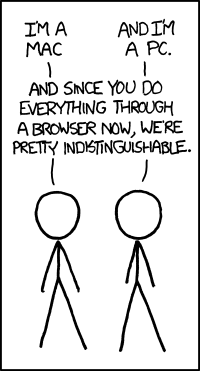This not about Mac vs. PC.
This is about the Network (uttered in tones of reverence) - not the network (which we all use via our phones, our laptops, our gaming systems etc).
In schools, we love the concept of the Network. Not in the wide world connected definition, but the connect your device and store stuff in one secure environment type of concept. Every school I know about here in South Australia has a Network. It is usually set up for the staff and students to use exclusively when within the school environment. If it's not on "the Network" then it is isn't allowed in the school. It involves passwords and user profiles and printer permissions and wireless certificates (should your school be lucky enough to have some form of wireless environment). There are Windows Networks (the vast majority here in SA) and there are Mac Networks, and a few adventurous sites title themselves as cross-platform when they have a combination of both. I don't know too much about Linux although Grant High School (under the vision of Peter Ruwoldt, now in the APY Lands in the Far North of SA) were using Ubuntu in an extremely innovative way to build skills and engage with the wider community.
For teachers, the Network is a necessary evil. It keeps things "safe", is a place for the organisation and sharing of digital resources, and gives each staff member and student a safe digital storage space. Of course, many teachers still struggle with things like passwords, how to navigate to a folder to find something they had created earlier and sometimes need to write all of this process down on a piece of paper. Many believe that it is the Network that gives them access to the internet (the lower case n network) in much the same way that they believe the interactive whiteboard is a magical device, forgetting that it is just a dormant piece of plastic connected to the real magical device, the computer. So, it follows that many (not all and just in my experience) teachers like the idea of a single platform Network, preferably on a platform that they are familiar and comfortable with. Cross platform can evoke responses of fear and panic, and strategies of survival that unfortunately manifest themselves in restricted opportunities for students. Technicians within schools also command a fair bit of sway when it comes to determining a school's platform/Network direction. Those with Windows Server knowledge will talk down Mac software, complain about the hassle of dual platforms and highlight every single networking issue (real or imagined) that they can think of. And it works back the other way with gripes about messy updates, the constant vigilance against viruses and so on. And as for Linux, even though even a non-technical person like myself knows that its existence has borne much of the computing world as we know it, well, some technicians will complain about the lack of paid support and posit that if it is free, then it can't possibly be any good.
I like to believe that I am platform agnostic. I am happy to find my way around any OS, although my Ubuntu experience is limited to the Netbook Remix version sitting on my oldest son's netbook. Windows has a certain logic to it that seems to make sense in a school Network - and kids can easily save work to their folder and retrieve the contents from any connected computer on the system. I love my MacBook Pro and will probably buy Mac again for my own personal use - and it has become a bit of a cliche at my school with teachers who have become fervent Mac users to quote,"Once you try Mac, you'll never go back."
So, at my school, we are cross platform. This is as much about a conscious decision to do so as it was that when the three closing schools pooled their collective technology stock that there was a split of Macs and PCs that needed to be used. However, there are many advantages to have a foot in each major camp, so to speak. We don't want kids who are like some of the teachers - scared of a particular platform because they will need to "learn something new". In a world that is web based, whether your browser sits in a Windows OS or a Mac one is entirely irrelevant until instinct has you lunging for either the right or left side to close the window. As long as kids can make sense of menus and taskbars and file paths, then there is no good reason why Office should be preferred over other word processing tools, no reason why iMovie should be the only way to edit video. And with tablet devices bringing in more alternative operating systems (Android, iOS etc.) restricting today's learners to only one company's worldview of technology aided learning just doesn't make sense. I know the big companies probably don't support this point of view - things like Microsoft Innovative Teaching awards and Apple Distinguished Educator programs just emphasise that one way is the way to go. But learning isn't device dependent - but it is increasingly becoming network enabled. And I mean the one without the capital letter.

- http://imgs.xkcd.com/comics/mac_pc.png


